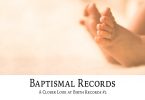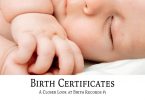There are times when you just cannot seem to find a birth record, no matter where you look. It is possible that a birth record for a particular ancestor simply never existed in any form, or that the record that once existed has long since been lost to time. Courthouse fires, moving houses in families, generations that don’t care about preserving such information, records that cities and towns accidentally threw away, and more can all mean there is no longer any birth record. Sometimes, your ancestor was born at home before it was mandatory to register a birth and the family did not have a family Bible or a church nearby to generate a baptismal record.
These instances can be frustrating for genealogists who want a birth date. The good news is that there are a few birth record alternatives that may exist for your ancestor. While they do not replace a real birth record, they are nonetheless useful and maybe the closest you are able to come to finding the real birth date of an ancestor. These are some of the most common birth record alternatives you may use.
The US Federal Census — While most of the census records beginning with 1880 give an age for the person being enumerated (and this, alone, can give you a general idea as to the birth year for a person—though sometimes ages were off by a few years in census records), the 1900 US federal census actually gives a month and year for the enumerated person’s birth. While it doesn’t provide a day, it does give you a pretty close birth date for that ancestor.
Old Newspaper Records — While it was not as common to record a birth in a newspaper in the 19th century and before as it became in the early to mid-20th century, there were often small write-ups about children’s birthday parties. These can give you an approximation of when a person’s birth date was. Also, if anyone in the community lived to an exceptionally elderly age and had a birthday, the local newspaper would probably have a small article about it, which can also approximate a birthdate, if the elderly person was your ancestor.
Other Vital Records — Death and marriage records will usually include the subject person’s date of birth if the person filling out the form knew it. These are usually pretty reliable sources of birth dates, but are subject to human error, especially in the case of death records. With marriage records, the date is likely to be accurate, as the groom or bride, or both, typically filled them out personally.
Court and Military Records — Any time an ancestor went to court, enlisted in the military, or applied for a military pension as a veteran or a widow, there is a good chance a birth date was included, especially in records from the late 1700s and upward. These are always worth a genealogical check.






